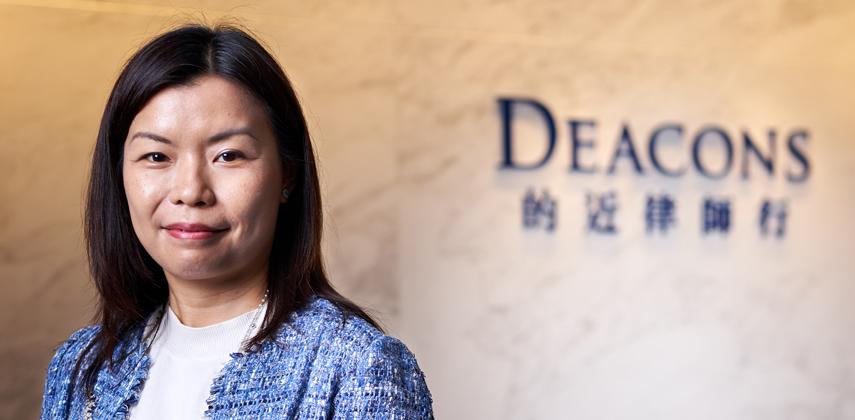Something clicked when, as a trainee lawyer, Annie Tsoi first worked on a case involving intellectual property. Though the area was little-known at the time, she was immediately attracted by the challenge of dealing with groundbreaking legal issues and their commercial implications, and it didn’t take long to realise she had found her niche.
“You could say I got into this area by default,” says Tsoi, now IP partner for leading law firm Deacons. “At university, I thought I’d become a banking lawyer, but I had a summer placement with a boutique firm specialising in IP and fell in love with it. I find it’s closer to real life and normal, everyday things. I’m dealing with cosmetics, cartoon characters, watches and pharmaceuticals, though of course the clients may be big international companies or movie studios.”
In essence, Tsoi’s cases relate to patents, copyright, trademarks and design. However, the scope also extends to trade secrets, domain names and data privacy. And, increasingly, companies are not just looking for protection or to assert monopoly rights, but are also using IP as a profit centre, licensing out rights for everything from iPhone cases and clothing to tumblers and stationery.
“Quite a big chunk of our work is still protection against counterfeits and infringement, where products look like the original luxury goods,” Tsoi says. “But licensing has really moved forward over the last few years and can even include source codes for software developers, and that requires a certain expertise.”
Typically, her clients own the rights and need a specialist attorney in the region to work with their external counsel. Efforts to harmonise international practice and laws for IP have made considerable progress, but countries still have different priorities and resources, so cases will often involve on-the-ground detection work.
“I deal a lot with China,” says Tsoi, noting things are definitely better there than 20 years ago because of pressure from trading partners worldwide. “When we receive a complaint from a client, we trace it, bearing in mind different regions in China focus on certain products — for example Ningbo for home electronics and Wenzhou for counterfeit shoes – so there are usually some leads.
“These days, there is more assistance from customs, so if you record a registered trademark and if a factory is not authorised, they stop or detain the goods and notify us to verify if they are genuine. They give us three days to verify and we can then stop goods being exported.”
Sometimes, it is straightforward if, say, the client never manufactures such items in China. In other cases, where rights are licensed to different sourcing agents who perhaps have different distributors in Asia, Russia and America, the client must provide very accurate information on the rights enjoyed by the various licensees.
“To sue the infringer through the courts is not the first option; it is relatively time consuming and costly,” Tsoi says. “In China, the administrative approach with customs seizure and destroying the goods is more effective. We normally proceed against the exporter because there may be different ‘layers’ which make it a little difficult to take action against the manufacturer.”
When necessary, she adds, the firm’s lawyers may call in commercial investigators. They can also turn to the MRA (Market Regulatory Authority) in China if intelligence shows a certain factory is infringing. And, addressing the bigger picture, they advise clients in putting forward proposals to a Chamber of Commerce or even at government level.
“If we find a good case and deal with it, we send a clear message to the infringers that we will track you down,” she says. “It is also a way to tell clients we can help them safeguard their business and sales.”
As one of three sisters, Tsoi grew up in “married quarters” in Kennedy Town, where her father was a policeman and her mother a housewife. There were certain financial strictures, but she recalls a happy childhood in a down-to earth community, with half-day school and dim sum every other day.
A neighbour, who was something of a role model, went to St Stephen’s Girls’ College and, in due course, Tsoi chose to go there too, mainly because she liked the uniform. It turned out well, though.
“We were strongly encouraged to speak our minds, discuss difficult topics and pursue what we thought was the right thing to do. I learned to be a very independent person.”
She went on to complete the three-year bachelor of laws at the University of Hong Kong in 1991, and then did the PCLL before joining a relatively small law practice.
As an articled clerk, she worked on personal injury, medical negligence and legal aid cases, but particularly remembers the first related to IP. It involved two university professors, one accusing the other of copyright infringement of survey results linked to medical research.
The judge’s ruling noted instances of the same grammatical errors and the misappropriation of words and, somewhat unexpectedly, Tsoi found a career interest that grew in importance as Hong Kong evolved into a knowledge-based economy.
In 1994, she moved to Simmons & Simmons to get broader experience with bigger-name clients, but sensing a bit of a bottleneck, switched three years later to Deacons. The firm had long been regarded as the “Shaolin” of IP and her main brief was to expand its China practice.
A partner since 2001, Tsoi now balances a full caseload with a place on the management board, overseeing the firm’s 700-odd employees and four mainland offices.
Besides that, she leads the firm’s volunteer and CSR activities and helps the in-house academy train up-and-coming lawyers.
“I’ve always been very blessed in my career,” says Tsoi, whose two teenage children are currently studying in the UK. “Now I want to help and influence other people. I have this platform and ideas I want to carry through.”


